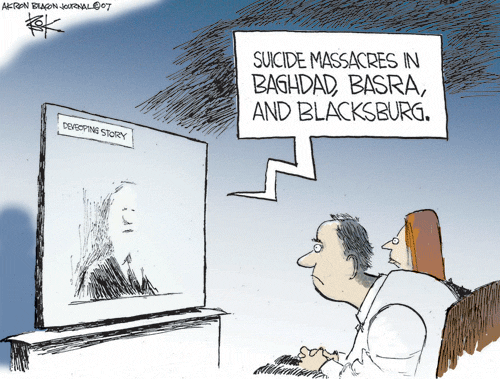Monday, April 23, 2007
WSJ: Suicide Car Bombs Kill 13 in Baghdad

Suicide Car Bombs Kill 13 in Baghdad
April 22, 2007 8:55 a.m.
BAGHDAD -- Two suicide car bombers attacked a police station Sunday in western Baghdad, police said, killing at least 13 people and turning nearby buildings into piles of rubble.
The violence underscored Prime Minister Nouri al-Maliki's efforts to win Arab support for his struggling government on a four-nation tour around the region.
A man who was among the 82 wounded in Sunday's attack staggered through the wreckage. "All our belongings and money were smashed and are gone. What kind of life is this? Where is the government?" he asked. "There are no jobs, and things are very bad. Is this fair?"
The first driver raced through a police checkpoint guarding the station and exploded his vehicle just outside the two-story building, police said. Moments later, a second suicide car bomber aimed at the checkpoint's concrete barriers and exploded just outside them, police said.
The blasts collapsed nearby buildings, smashing windows and burying at least four cars under piles of concrete. Metal roofs were peeled back by the force of the explosions. Pools of blood made red mud of a dusty driveway.
Iraqi police stations often are the target of attacks by insurgents who accuse the officers of betraying Iraq by working in cooperation with its U.S.-backed Shiite government and the American military.
The blasts occurred at about 10 a.m. in Baiyaa, a mixed Sunni-Shiite area of western Baghdad, a policeman said on condition of anonymity because he wasn't authorized to talk to the media.
![[Nouri al-Maliki]](http://online.wsj.com/public/resources/images/HC-GI169_alMali_20060613150841.gif)
He said 13 people died -- five policemen and eight civilians -- and that 82 were wounded: 46 policemen and 36 civilians. Black smoke billowed up into the sky and ambulances raced to the location with sirens wailing.
A top U.S. general said Sunday that American forces had no technology capable of detecting all suicide bombers before they strike. Lt. Gen. Martin Dempsey, who is in charge of training Iraqi troops, said the only solution is for Iraqi forces, government officials and civilians to work together to stop the terrorist cells planning attacks.
"There is no technological solution that will guarantee that we can prevent ... either a suicide bomber or a suicide car bomber from entering into the populated areas," Dempsey told reporters in Baghdad's Green Zone.
The bombings in Baiyaa also damaged homes and auto repair shops near the police station. At least two mechanics were wounded by shrapnel and debris. "I was thrown outside my shop by the huge blast, and I saw my colleague in the shop next to me lying on the ground motionless, with pool of blood beneath him," said Anmar Abdul Hadi, 20.
Another car repairman, 25-year-old Mohammed Abdul-Hussein, said: "I heard two explosions and was thrown near the car I was working on. Smoke filled the area and I couldn't see my fellow workers at first." He suffered a shoulder wound.
In addition to Baiyaa police officers, the station had been serving as the temporary headquarters for police from Dora, a neighborhood in southern Baghdad. Last month, a suicide truck bomber demolished the Dora station, killing at least 11 people.
In other violence, a former member of Saddam Hussein's Baath Party was gunned down near his house in Fallujah, police said.
In Suwayrah, 25 miles south of Baghdad, three bodies were found floating in the Tigris River, blindfolded with the hands bound, and gunshots in the head and chest, said morgue official Maamoun al-Ajili.
In Basra, Iraq's second largest-city, 340 miles southeast of Baghdad, the British military said a suspect accused of attacks on British and Iraqi troops in the area was killed in a raid. Two of the man's brothers were arrested, a spokeswoman said.
Details emerged Sunday about a mortar attack the day before inside Baghdad's U.S.-guarded Green Zone. A spokesman for Ahmed Chalabi, who runs the Supreme National Commission for de-Baathification, said a mortar round landed on Mr. Chalabi's office, which was empty at the time. No one was harmed.
Mr. Maliki's trip abroad, which began Sunday in Egypt, came at a precarious time for his regime. He suffered a blow last week when six Cabinet ministers allied to the radical Shiite cleric Muqtada al-Sadr quit the government, to protest the prime minister's failure to back calls for a timetable for the withdrawal of U.S. forces. Mr. Maliki is expected to name replacements in the coming days.
The Iraqi prime minister met privately for 45 minutes with President Hosni Mubarak. Neither side commented about what was discussed. After Egypt, Mr. Maliki is scheduled to visit Kuwait, the United Arab Emirates and Oman.
Copyright © 2007 Associated Press